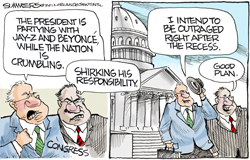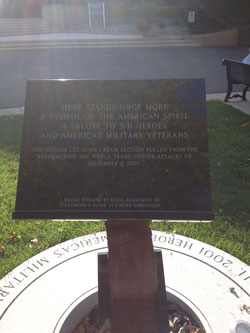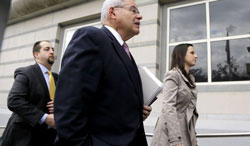Republicans and Democrats are Digging in and not Budging on Crucial Issues
 “Gridlock.” It is something that has become a familiar term in political news lately. It happened twice in 2011 according to CNN, nearly shut down the government and some businesses, and it seems like it is on the verge of happening again.
“Gridlock.” It is something that has become a familiar term in political news lately. It happened twice in 2011 according to CNN, nearly shut down the government and some businesses, and it seems like it is on the verge of happening again.
But what is “gridlock” anyway? Is it a traffic jam? Is it a power failure? Gridlock, in relation to politics, is the stalemate between Democrats and Republicans when they disagree about how to proceed. Assistant Communication Professor Michael Phillips-Anderson says, “Gridlock refers to the two parties not finding a way to compromise on legislation.”
According to a CNN article, in 2011 the gridlocks were due to budget talks.
According to an article in The Star Ledger, “Now, as the year 2012 comes to a close, and tax hikes and spending cuts are slated to kick in, Congressional leaders and White House officials find themselves dangerously close to that stalemate again.”
Dr. Charles Cotton of the Political Science Department says that as long as we have a two party system in Washington, there will always be a focus on opposition. “Will there always be gridlock? Yes, because the parties (Republican and Democrat) are so similar, yet they try to be different,” said Cotton. “They’re never going to be friends, but they do respect each other more than people think. Politicians do their job because they care about people. They just go about it in very different ways.” Gridlock in Washington often creates fatigue in Americans. In fact, at the end of 2011, Congress’s approval rating amongst the American people was the lowest it had ever been recorded. The year 2011 also happened to be Congress’s least efficient year in getting legislature passed and bills signed.
So, as a college student, one may be wondering how this gridlock problem affects you, if it affects you at all. Katelyn Nawoyski, a senior communication and political science major, said, “College students should care about gridlock because the decisions that are being made – or not being made, for that matter – are decisions that are going to affect our futures.” Phillips-Anderson agrees, “It’s [gridlock] stopping things from getting done. It has an impact now and will continue to affect students when they graduate.”
As far as the fiscal cliff and Gridlock: Where No One Wins gridlock are concerned, Cotton said, “National interests supersede politics. The decision is really about whether we should let the Bush-era tax cuts expire, if we should let them continue, or if maybe it is time to try something new.” Part of the reason the government almost shut down last year was because an agreement could not be made as to how to solve the national debt crisis. Congress managed to extend the talks and buy some time, but the debt is not going away on its own, and a decision needs to be made.
Now, some are probably wondering how the gridlock problem can be solved. Unfortunately, it seems that as long as people think and take in interest in politics, there will always be opposition. But that does not mean that students cannot make a difference if they really want to.
According to Cotton, “Young people can make a difference. If more people get involved, we can see change. The trends are progressing in a certain way. These trends are moving towards the Democrats and the middle line that separates the two parties is shifting too. If young people want to see change, they need to get involved at an early age. They need to vote, and get others involved and change will happen. They will see it.”
IMAGE TAKEN from trbimg.com



